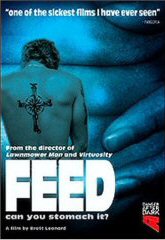
Often securing the very social stability that their plots seem to challenge, the horror film -- one of cinema's most subversive forms -- is often one of the most conservative. Reaffirming the traditional moral perspectives of the common ruling and/or middle class, horror is often quite a conservative little beast, allowing its ghouls and madmen only temporary sway. Whether dealing with psychological thrillers or the pleasures of dark fantasy, challenges to the social norm come at a heavy price. Sure, the monster may be allowed to rampage temporarily but eventually order is restored, the threat is dispelled, and a moral has been either purposely or unconsciously upheld (don't have sex, don't disobey, don't temper with science, don't play God . . . you get the idea!). Rare is the fright film that breaks with tradition and neither condemns or praises the villain. Rarer still are those that truly disturb, seeking to inspire dread and repulsion, not to coddle self-satisfied audiences with life-affirming Cineplex thrills. Feed, despite its uneven plot and faults of pacing, is a mean little Bastard that asks for no friends. Digging beneath the skin of preconceived notions of right and wrong, good and evil, its purplish bruise of a theme peels back the skin of societal respectability.
In a nihilistic plot combining unflinching psychological deviation with the thrill and shame of voyeurism, Feed follows the investigation of a 'cyber crime' investigator (Patrick Thompson) who becomes obsessed with an online serial killer who feeds lonely obese women to death. An agent for the Australian police in Sydney, he and his partner are monitoring perverts via the internet when they stumble upon a man in Germany feeding himself to a cannibal. Amidst rough sex with his kinky girlfriend and an unravelling sense of self, he stumbles on a site celebrating obese women. Soon he discovers that the women's life statistics are being recorded online, suggesting that something odd is going on. When his boss refuses to let him check out the site's headquarters, insisting instead that he takes a leave of absence, he finds himself single (his girlfriend checking out of their abusive relationship), and decides to heads across the ocean anyway. In little time he tracks down Michael Carter (Alex O'Laughlin), a disturbed young man who, after losing his mother, was raised by a local priest. The reason why he was kicked out, and the results, are the life's blood of this character's psychosis, and best left as a surprise . . .
This horrific hybrid combines the grim atmosphere of Noir with the plotting technique of police procedurals. Despite nods to Seven, Feed attains its own identity, focusing on obsession, the nature of fetishes, and culpability. While the picture may turn off those in search of simple adrenaline highs, the somber implications of the story stick to the soul. Expect to be challenged, disgusted, and sickened by the 'consenting' acts that the 'feeder' and the 'eater' engage in. The images are so repulsive that it takes time to appreciate the psychological depths of the script. Concerned more with exploring the dimly lit corridors of madness and the wages of a culture fixated on 'watching,' Feed is that rare breed of cinematic monster, selling dark miracles in a minimalist fashion with little (if any) moralistic vantage point. Perhaps this is the point. Terror needs no redeeming values. Redeeming to whom? For what? For telling its story well? When a horror movie achieves its goals and is truly disturbing, we apologize for it, and allow those who detest the genre to put us on the defensive by scrambling around in search for 'redeeming' values, as though a story is obligated to appeal to and/or preserve a certain pre-defined moral message. Nonsense! Such films as Henry, Maniac, and Feed have no 'redeeming' values, nor do they need them. Their power lies in their objectivity. A suspenseful script by Kieron Galvin, and the inspired direction of Brett Leonard, makes this film a breath of fresh dark air in a genre dying beneath an avalanche of worthless remakes and teeni-bop terrors. Bon- appetite!
The visual quality of Feed is up to par with other TLA releases. Featured in 1.78.1 anamorphic widescreen, the transfer is clean with realistic flesh tones. A few compression artifacts occasionally mar the picture, but nothing too extreme. Audio is featured in both Dolby Digital 5.1 Surround Sound and DTS 5.1 with optional English subs, both of which offer clear dialogue and distribution between music and sound effects.
Extras are informative and invigorating, evoking further understanding of the filmmaking process and a better appreciation of the creative choices that went into the construction of the story. These include ten deleted scenes which, while interesting, add nothing of significance to the plot, and an alternate ending that would have given a creepier, more complex feeling to the story had it been used. Interviews are next, including chats with director Brett Leonard, stars Alex O'Loughlin and Jack Thompson, and, finally, producer Melissa Beauford. These reveal the personalities of each subject as well as the feeling of companionship that existed on the set, exploring how Leonard evoked the helpless atmosphere that makes the film of emotionally draining. Footage from the film's premiere in Philadelphia is next, as well as behind-the-scenes footage, and, as a surprisingly light touch, a mock infomercial.
Review by William P. Simmons
| Released by TLA Releasing |
| Region 1 - NTSC |
| Not Rated |
| Extras : |
| see main review |